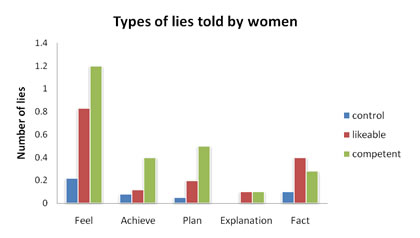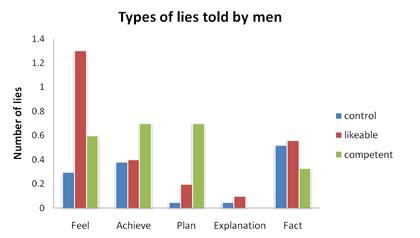Meeting someone new? You’re likely to tell 3 lies in 10 minutes:
.Feldman et al. (2002) told 121 participants they were going to have a chat with someone new for 10 minutes. Then half were divided into 3 groups, each with different goals from the conversation:
- Competence: try to present yourself so that the other person thinks you’re are competent.
- Likeable: try to present yourself so that the other person thinks you are likeable.
- Control: no specific goal.
All the participants were secretly videotaped during the conversation then, afterwards, asked to point out their own lies. They were told that lies include things like falsely agreeing with others and the misrepresentation of feelings. Then, while watching the video, they wrote down all the instances of their own lying.
The tangled web we weave
The very first thing to say is that 40% of people claim to have told no lies whatsoever. Whether you believe them or not is a different matter, but it’s probably not that far from the truth, after all there wasn’t that much motivation to lie in the first place. It was just a bit of chit-chat in the lab, it’s not as if they were trying to cover up a murder.
The other 60% did report some lies, though, with the average number being just under 3 in the 10 minutes. The lies they told were categorised as either subtle, exaggerations or outright lies. The most popular category of lie was the outright lie.
Lies were also categorised as to whether they were self-oriented or other-oriented with men telling more self-oriented lies than women. Overall, though, men and women told about the same number of lies, contrary to the popular conception that men are bigger liars than women.
But what, exactly, did they lie about? Lies were categorised by the researchers into 5 areas: feelings, achievements, plans, explanations and facts. Below is the breakdown for women and men in each of the 3 conditions: the control group, the group asked to appear likeable and the group asked to appear competent (these are averages for the 10 mins).
As you can see the most popular category was feelings which, in this study, included lies about emotions, opinions and evaluations. Lies about feelings were particularly pronounced when women wanted to appear competent and when men wanted to appear likeable. This is a well-known finding: people are often found to lie more about their feelings than anything else.
Join over 320,000 readers. Get a free weekly update via email here.
Related posts:
New Neuroscience Reveals 4 Rituals That Will Make You Happy
New Harvard Research Reveals A Fun Way To Be More Successful
How To Get People To Like You: 7 Ways From An FBI Behavior Expert






